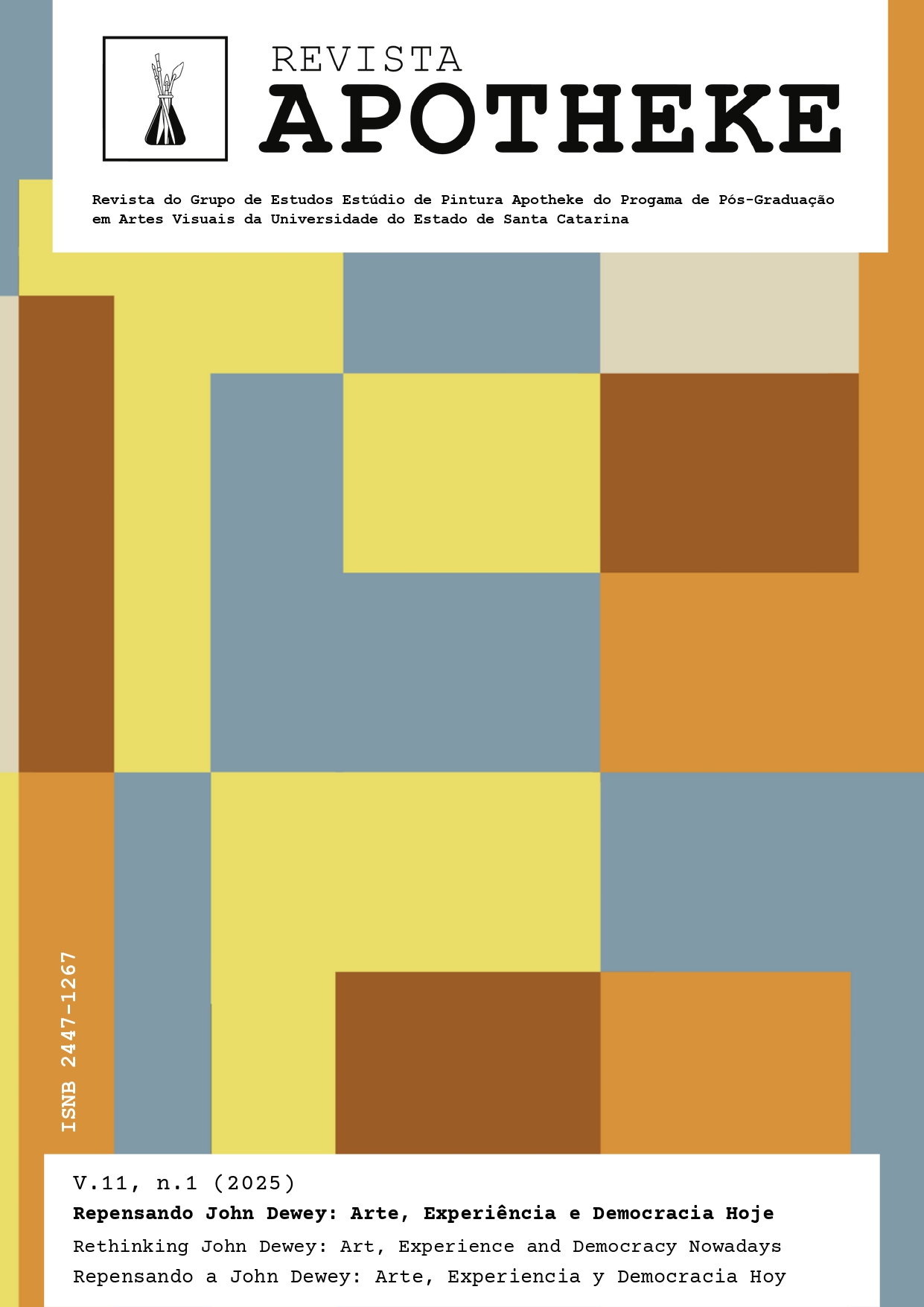A Continuidade e o Elemento Estético da Experiência no Fazer Docente
DOI:
https://doi.org/10.5965/244712671112025039Palavras-chave:
Dewey, Experiência, Experiência Estética, Fazer DocenteResumo
Este artigo tem por objetivo apresentar e discutir algumas peculiaridades do conceito de experiência estética deweyano, destacando-o como um elemento presente em qualquer experiência e, a partir dessa peculiaridade, traçar um paralelo entre a continuidade e a presença desse elemento estético com o fazer docente. Trata-se de uma pesquisa bibliográfica na qual a fonte primária é o livro Arte como experiência de John Dewey. E, para alcançarmos nossos objetivos dividimos o texto em duas seções. Na primeira, apresentamos o conceito de experiência deweyano e, na segunda seção, a proposta é estabelecer uma relação entre as características da experiência (continuidade, emoção, elemento estético e consumação) com o fazer docente. Concluímos que o papel ativo entre espectador e artista se repete na relação entre professor e aluno, pois, tanto o professor como o aluno desempenham papel ativo na apresentação, criação e recriação dos conteúdos na aula e, essa criação e recriação se compõem na própria experiência da aula.
Downloads
Referências
DEWEY. John. Arte como experiência. Trad. Vera Ribeiro. São Paulo: Martins Fontes, 2010.
DEWEY. John. Democracia e educação: introdução à filosofia da educação. Trad. Godofredo Rangel e Anísio Teixeira. 4 ed. São Paulo: Companhia Editara Nacional, 1979.
DEWEY. John. Experiência e educação. Trad. Renata Gaspar. Petrópolis: Vozes, 2011.
FREIRE, Paulo. Pedagogia do Oprimido. 50 ed. Rio de Janeiro: Paz e Terra, 2011.
HAUBERT, Laura Elizia. Notes on aesthetic experience and everyday experience in John Dewey. Cognitio estudos, São Paulo. Vol. 16, nº. 2, julho-dezembro, p.222-232, 2019.
HENNING, Leoni Maria Padilha. Experiência, arte e educação pela perspectiva analítica de Dewey. Revista Apotheke, Florianópolis, v. 9, n. 2, p. 152–167, 2023. DOI: 10.5965/24471267922023152. Disponível em: https://www.revistas.udesc.br/index.php/apotheke/article/view/24233.
SHUSTERMAN, Richard. Pragmatist Aesthetics: living beauty, rethinking Art. New York: Rowman & Littlefield Publishers, INC, 2000.
PIAI, Maria A. L. Da Impulsão à Expressividade: Uma Análise da Expressividade Artística a Partir da Filosofia Deweyana. Revista Apotheke, Florianópolis, v. 7, n. 2, 2021. DOI: 10.5965/24471267722021079. Disponível em: https://periodicos.udesc.br/index.php/apotheke/article/view/20747.
Downloads
Publicado
Como Citar
Edição
Seção
Licença
Copyright (c) 2025 Maria Aparecida Lima Piai

Este trabalho está licenciado sob uma licença Creative Commons Attribution-NonCommercial 4.0 International License.
Os autores de trabalhos submetidos à Revista APOTHEKE autorizam sua publicação em meio físico e eletrônico, unicamente para fins acadêmicos, podendo ser reproduzidos desde que citada a fonte. Os mesmos, atestam sua originalidade, autoria e ineditismo.
Os artigos publicados pela revista são de uso gratuito, destinados a aplicações
acadêmicas e não comerciais. Os direitos autorais são todos cedidos à revista. Os artigos cujos autores são identificados representam a expressão do ponto de vista de seus autores e não a posição oficial da Revista Apotheke. O(s) autor(es) se compromete(m) a sempre que publicar material referente ao artigo publicado na Revista Apotheke mencionar a referida publicação da seguinte forma:
"Este artigo foi publicado originalmente pela revista Apotheke em seu volume (colocar o volume), número (colocar o número) no ano de (colocar o ano) e pode ser acessado em: http://www.revistas.udesc.br/index.php/APOTHEKE/index"
É responsabilidade dos autores a obtenção da permissão por escrito para usar em seus artigos materiais protegidos pela Lei de Direitos Autorais. A revista Apotheke não é responsável por quebras de direitos autorais feitas por seus colaboradores.
Os autores mantêm os direitos autorais e concedem à revista o direito de primeira publicação, com o trabalho licenciado sob Licença Creative Commons do tipo atribuição BY-NC:
Atribuição (BY): os licenciados têm o direito de copiar, distribuir, exibir e executar a obra e fazer trabalhos derivados dela, conquanto que deem créditos devidos ao autor ou licenciador, na maneira especificada por estes.
Uso Não comercial (NC): os licenciados podem copiar, distribuir, exibir e executar a obra e fazer trabalhos derivados dela, desde que sejam para fins não comerciais.
Após a publicação dos artigos, os autores permanecem com os direitos autorais e de republicação do texto.




